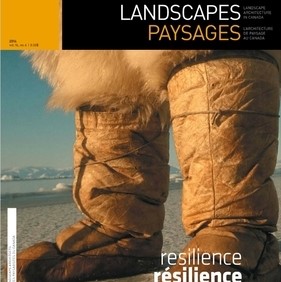Decarbonizing Landscape Architecture: Resources for a Low-Carbon Practice
As landscape architects, we play a vital role in shaping resilient and sustainable environments.
Decarbonizing landscape architecture practices is not just an environmental 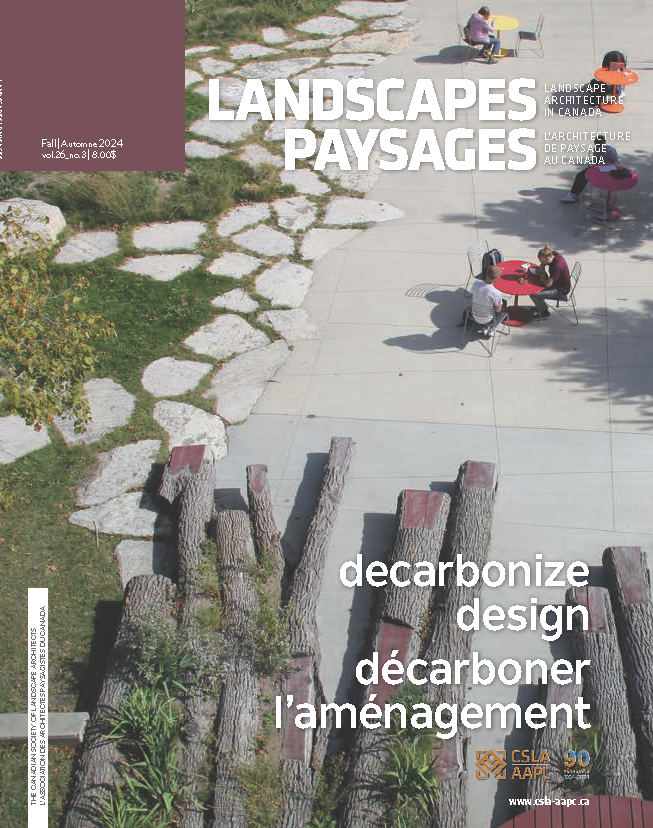 imperative but also a professional responsibility. By taking proactive steps to reduce our carbon footprints, we can lead by example and inspire broader change within our communities and beyond. Read the September 2024 issue of LP Magazine on Decarbonizing Design.
imperative but also a professional responsibility. By taking proactive steps to reduce our carbon footprints, we can lead by example and inspire broader change within our communities and beyond. Read the September 2024 issue of LP Magazine on Decarbonizing Design.
The following resources have been compiled to support firms and practitioners in reducing their carbon footprints, from conducting greenhouse gas inventories to adopting low-carbon strategies in day-to-day operations. Explore the following links to begin or advance your organization’s decarbonization journey.
American Society of Landscape Architects (ASLA) Resources
- Towards Zero Emission Business Operations: A Landscape Architect’s Guide to Reducing the Climate Impacts of Offices
- Collaborating with Industry Partners on Climate Action and Biodiversity: A Guide to Conversations Among Landscape Architects, Vendors and Product Manufacturers
Australian Institute of Landscape Architects (AILA) Resources
- Climate Positive Design Guidelines. Volume 2. Organisation guide to Climate Positive
- Also available, a recording of the AILA webinar: How to make your business climate positive
Landscape Institute (LI) Resources
BMO Climate Smart
The CSLA is committed to supporting its members in this journey through resources, partnerships, and advocacy. As a CSLA member, you, your firm or organization are eligible for a 15% reduced rate on services with BMO Climate Smart for a limited time (offer expires April 2025). The Climate Smart program includes software, training and sustainability adviser-support to enable businesses and organizations to start their transition to net zero by measuring, reducing and reporting their corporate carbon footprint. To learn more, visit their website.

Tools for calculating the climate impact of materials, plants and landscape plans
Understanding the climate impact of landscape projects is essential for reducing greenhouse gas emissions and making informed, sustainable choices. The tools listed below help landscape architects assess the carbon footprint of materials, plants, and overall landscape plans. From calculating embodied carbon in products to evaluating the carbon sequestration potential of green spaces, these tools enable practitioners to integrate carbon considerations into the design process.
Pathfinder, by Climate Positive Design
Landscape Carbon Calculator, by Landscape Analytic Solutions
Carbon Conscience App, by Sasaki
i-Tree, by the United States Department of Agriculture Forest Service
CSLA and Component Association Publications on Climate Change
Click on the covers below to view the publications.
A number of resources are also available by geographic region:
Atlantic Provinces - Québec - Ontario - Prairie Provinces - North - British Columbia
 Landscape architect's goal of nature-based infrastructure
Landscape architect's goal of nature-based infrastructure
If you think of landscape architecture, you might conjure gardens and plantings. But in a rapidly changing climate fueled by intense heat, flooding, fires, smoke and hurricanes, architect and designer Kate Orff is helping redefine her field and push us all toward new climate adaptation solutions.
IUCN WCPA and partners launch guide to effectively and equitably conserving at least 30% of the Earth by 2030
 The International Union for Conservation Nature’s World Commission on Protected Areas (IUCN WCPA), working in partnership with WWF, GEF and TNC, has launched a freely available guide to achieving Target 3 or the “30x30 target” of the Global Biodiversity Framework and effectively and equitably conserving at least 30 per cent of the Earth by 2030.
The International Union for Conservation Nature’s World Commission on Protected Areas (IUCN WCPA), working in partnership with WWF, GEF and TNC, has launched a freely available guide to achieving Target 3 or the “30x30 target” of the Global Biodiversity Framework and effectively and equitably conserving at least 30 per cent of the Earth by 2030.
Mapping the Vulnerability and Exposure to Extreme Heat Waves of Populations Living in Housing in Canadian Communities
 The Department of Geography of Université Laval has just launched a new online application dedicated to mapping the vulnerability and exposure to extreme heat waves of populations living in 156 urban areas across Canada. This application is free to use and available to industry professionals as well as the general public.
The Department of Geography of Université Laval has just launched a new online application dedicated to mapping the vulnerability and exposure to extreme heat waves of populations living in 156 urban areas across Canada. This application is free to use and available to industry professionals as well as the general public.
The tool allows for the identification of geographic areas that are vulnerable and/or exposed to heat waves, which will help specialists formulate more effective mitigation strategies, assist in decision making and establish procedures related to heat wave periods. Organizations can also take advantage of the application by downloading the geospatial data and integrating it into their GIS software.
Planning for Infrastructure Success: An assessment methodology to drive growth, resilience, environmental sustainability, and inclusion
Infrastructure is the foundation upon which we build entire societies and economies. It underpins sustained well-being. IFSD has developed a best-practice framework for driving better infrastructure performance in an uncertain world, navigating trade-offs due to scarce fiscal resources and linking assets and investments to the outcomes that citizens want.
 Indigenous Knowledges Climate Atlas
Indigenous Knowledges Climate Atlas
Indigenous ways of knowing and being are critical for understanding, observing, and addressing climate change. Through this intergenerational experience and observation, Indigenous peoples were amongst the first to notice climate change and also have critical knowledges for navigating and adapting to it.
Action on Climate Team (ACT)'s Joint Statement: Canada’s National Professional Associations
This joint statement from four of Canada’s leading National Professional Associations commits to providing national leadership on advancement of Low Carbon Resilience (LCR).
Global Affairs Canada: Partnering for Climate: Increasing resilience through nature-based solutions
As part of Canada’s doubling of its previous climate commitment from $2.65 billion to $5.3 billion and its objective to leverage the climate action expertise and commitment of organizations in Canada, $315 million has been allocated for Partnering for Climate, to fund projects from civil society, Indigenous peoples and other organizations in Canada that will support climate change adaptation in Sub-Saharan Africa and other parts of the world.
 Guide: Climate action in small and rural communities
Guide: Climate action in small and rural communities
Is your small or rural community looking for a guide to help inform local climate planning? With the Small and Rural Communities Climate Action Guidebook, your community has access to case studies and climate strategies specifically designed for the small and rural experience. Produced by the Partners for Climate Protection (PCP) program and delivered by FCM and ICLEI – Local Governments for Sustainability, the guidebook can help you:
- Develop realistic climate action policies
- Generate local economic and wellbeing benefits through climate action
- Identify sector-specific climate challenges and solutions to overcome them
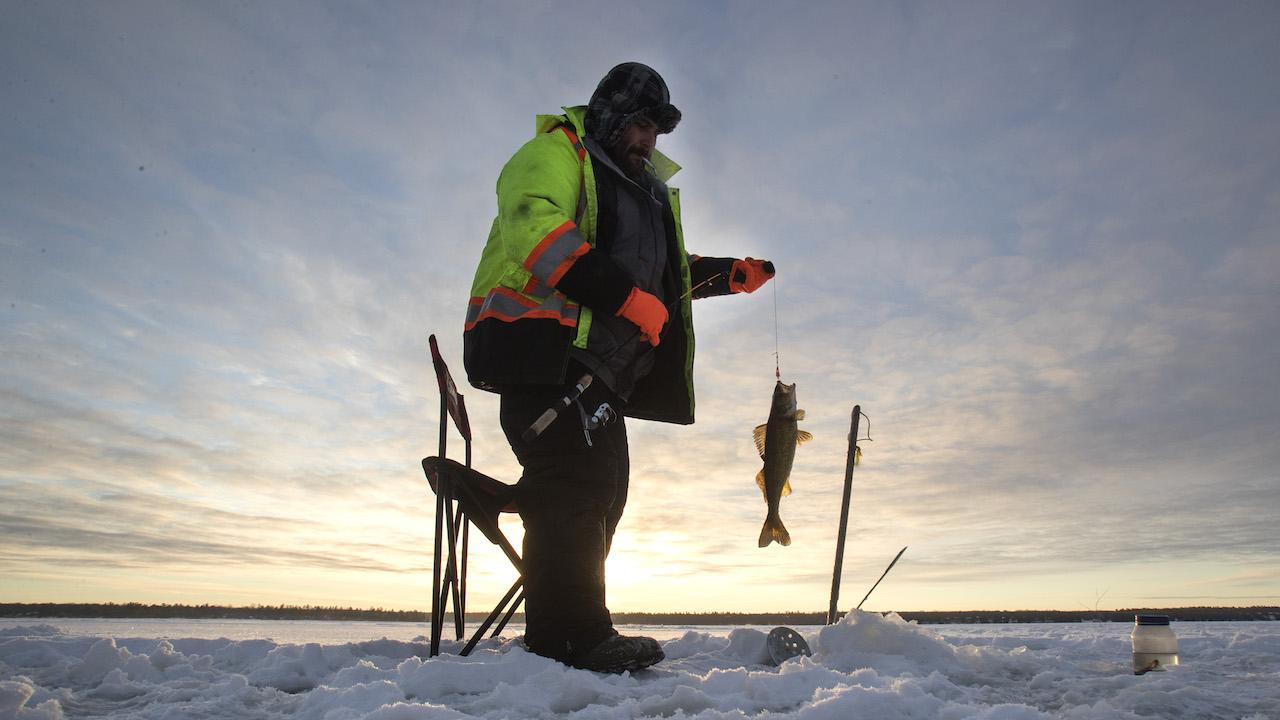 What are Indigenous knowledge systems — and how can they help fight climate change?
What are Indigenous knowledge systems — and how can they help fight climate change?
Indigenous communities have their own experts and ways of knowing. Here’s how people are working to bring them together with Western science to tackle the climate emergency
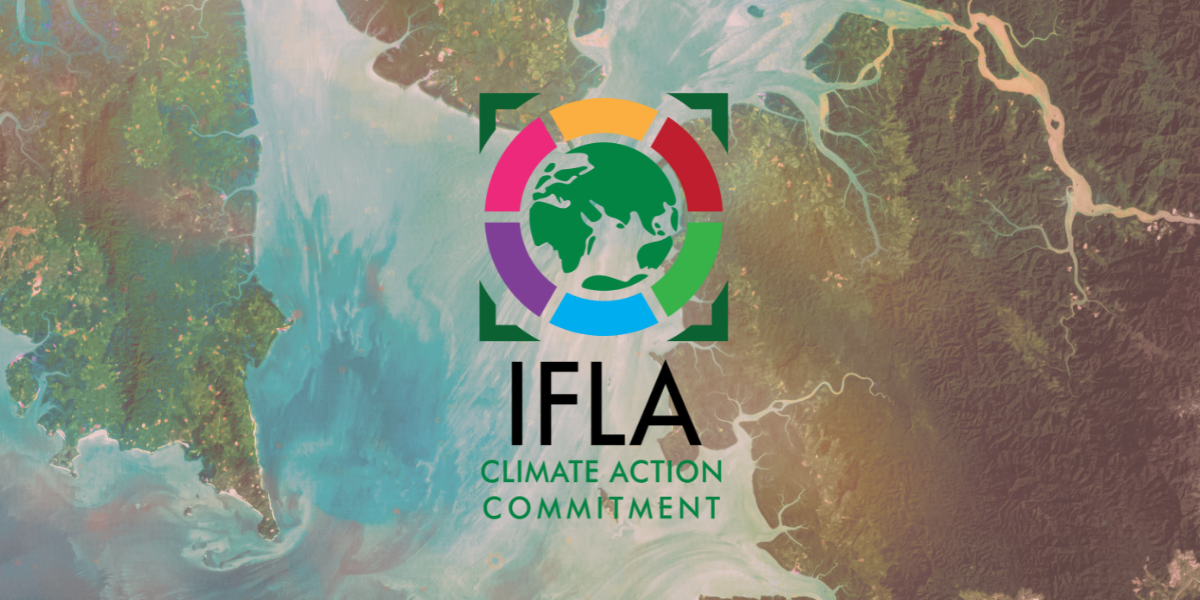 IFLA CLIMATE ACTION COMMITMENT
IFLA CLIMATE ACTION COMMITMENT
Over 70,000 landscape architects around the world are taking action as global citizens to limit planetary warming to 1.5° C.
ASLA Climate Action Now: A Landscape Architect's Guide to Climate Advocacy
The purpose of this guide is to help landscape architecture professionals become better climate advocates individually, as well as through firms, public institutions, non-profit organizations and community groups, and ASLA’s chapters and national organization.
The 2021 Canadian City Parks Report: Centring Equity & Resilience
How parks can help create more equitable, resilient cities—not only as we recover from COVID-19, but as we address another looming crisis: climate change.
 When it comes to climate change, the heavy hand of colonizers is as important as our carbon footprint
When it comes to climate change, the heavy hand of colonizers is as important as our carbon footprint
Why are we spending our focus, energy, and resources on decarbonizing oppression and exploitation, rather than on this very oppression and exploitation that created the climate crisis?
Landscape for 2030: How landscape practice can respond to the climate crisis
In June 2019, the Landscape Institute Board of Trustees declared a climate and biological diversity emergency. In its public statement, the LI committed to take real, tangible action, and promised to equip our members to tackle and adapt to these twin emergencies. This publication is one of the commitments we made in our Climate and Biodiversity Action Plan. It is an update of our 2008 Climate Change position statement, and seeks to further establish the landscape profession as leaders in the fight against climate change and biodiversity loss, as well as provide more best practice examples for our sector to follow.
The new case studies in this paper demonstrate the measures needed to create climate resilient, low-carbon places at all scales, from public squares to eco-parks. Our aim is to show stakeholders and governments at all levels the critical, central role that the landscape profession has to play in the delivery of climate change policy.
Canada in a Changing Climate: National Issues Report
 This report, led by Natural Resources Canada, is part of Canada’s National Knowledge Assessment process, Canada in a Changing Climate: Advancing our Knowledge for Action. The report provides a national perspective on how climate change is impacting our communities, environment and economy, and how we are adapting to reduce risks. It includes chapters on topics that are of national importance or that benefit from a pan-Canadian perspective, along with case stories featuring examples of adaptation in practice.
This report, led by Natural Resources Canada, is part of Canada’s National Knowledge Assessment process, Canada in a Changing Climate: Advancing our Knowledge for Action. The report provides a national perspective on how climate change is impacting our communities, environment and economy, and how we are adapting to reduce risks. It includes chapters on topics that are of national importance or that benefit from a pan-Canadian perspective, along with case stories featuring examples of adaptation in practice.
We hope that this report, as well as those that follow, will inspire you to take timely and meaningful actions for adapting to climate change and equip you with the information you need to do so.
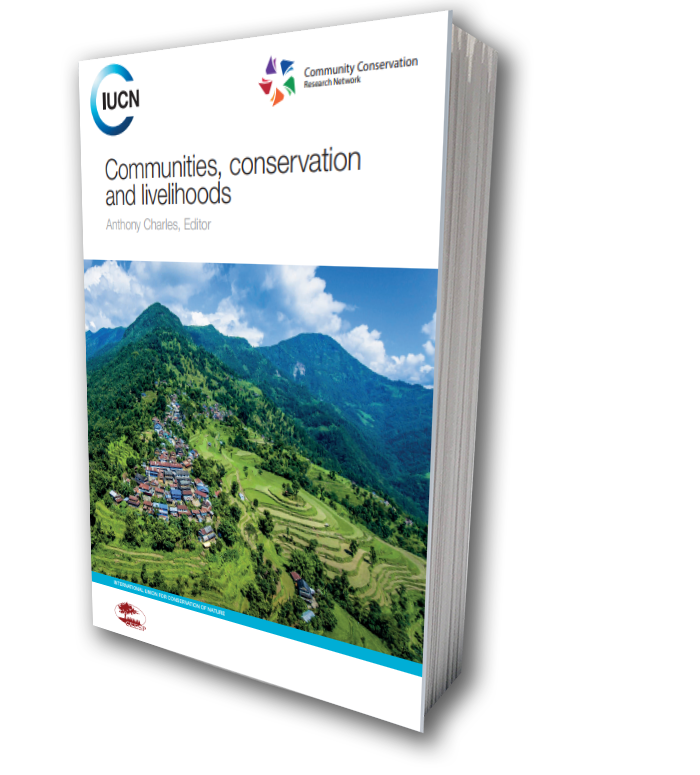 Communities, Conservation & Livelihoods…The Book
Communities, Conservation & Livelihoods…The Book
Communities, Conservation and Livelihoods is a new and freely-available book that focuses on the role of local communities, around the world, in conserving their environment while sustaining their local economies and livelihoods. It explores the conservation initiatives of communities, what motivates them, and what outcomes can be achieved for biodiversity and for livelihoods. The book looks at how decision-making works, how power is handled, and how Indigenous realities arise around the globe.
Tip of the Iceberg: Navigating the Known and Unknown Costs of Climate Change for Canada
The report is the first in a multi-year research program which analyzes and quantifies current and foreseeable climate-related impacts and their potential costs, and illustrates how adaptation at a national scale can help reduce these costs.
This report takes stock of measurable climate-related economic, social, and environmental damages and costs, providing policy makers with concrete data and recommendations to advance climate adaptation measures.
The Value of Nature in a Changing World
Virtual lecture by Colleen Mercer Clarke at the University of Guelph
Online Community of Practice: Natural and Nature-Based Climate Change Adaptation
A platform for peer-to-peer learning, information exchange and sharing of best practices for natural and nature-based climate change adaptation approaches.
How do Landscape Architects Improve the Environment?
Faced with growing social, political and economic concern over the use of natural resources, and the potential effects of a changing climate, there has never been a more important time to ensure that the sustainable use of natural resources is the backbone of design.
Watch the video by the Australian Institute of Landscape Architects
Colleen Mercer Clarke Featured on CBC's The Current
Colleen Mercer Clarke, former Chair of the CSLA's Committee on Climate Adaptation, was interviewed by CBC's The Current.
Prairie Climate Centre Resources
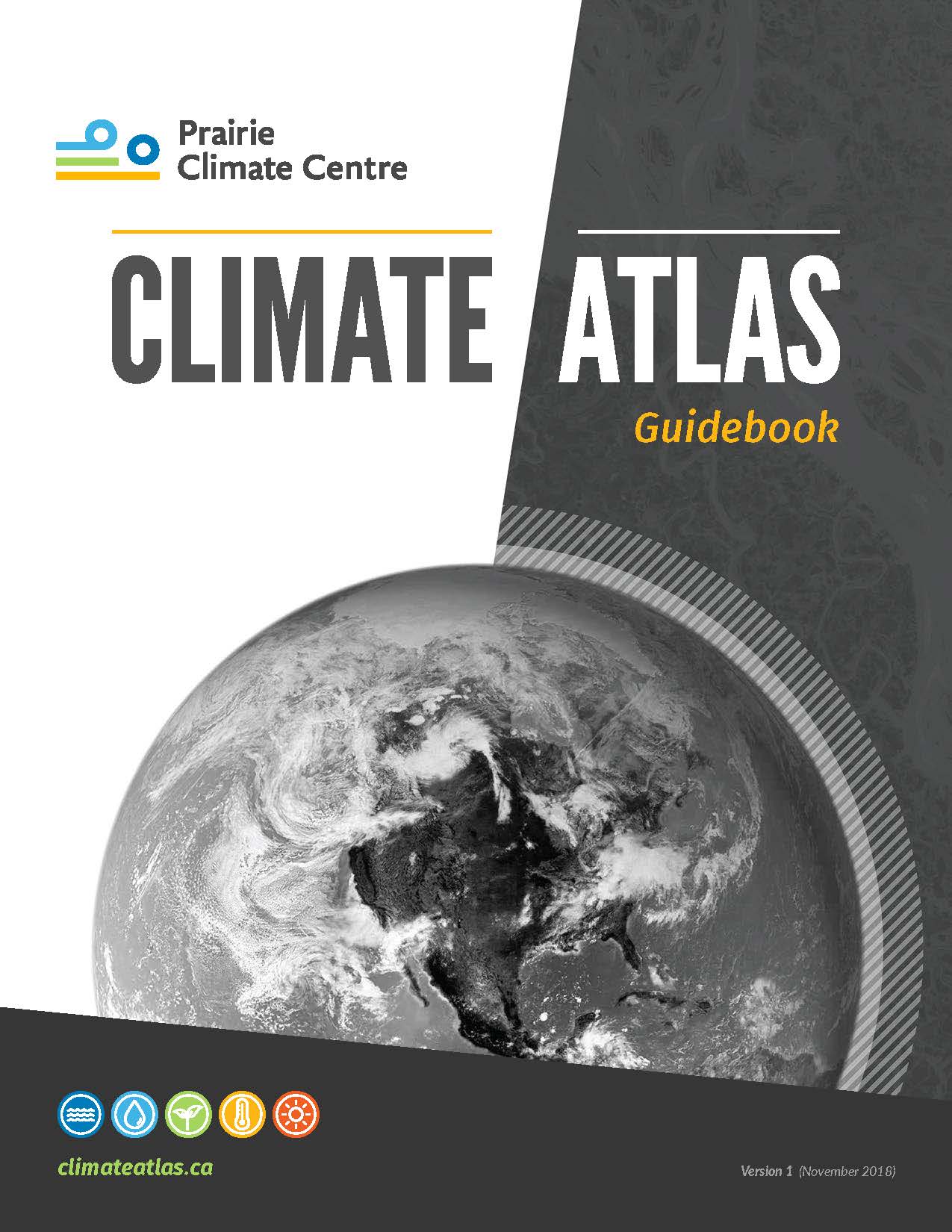 Climate Atlas of Canada
Climate Atlas of Canada
It combines climate science, mapping and storytelling to bring the global issue of climate change closer to home for Canadians. It is designed to inspire local, regional, and national action that will let us move from risk to resilience.
Link to the Climate Atlas of Canada
Climate Atlas Guidebook
A guidebook for landscape architects and planners was also developed by the climate atlas team.
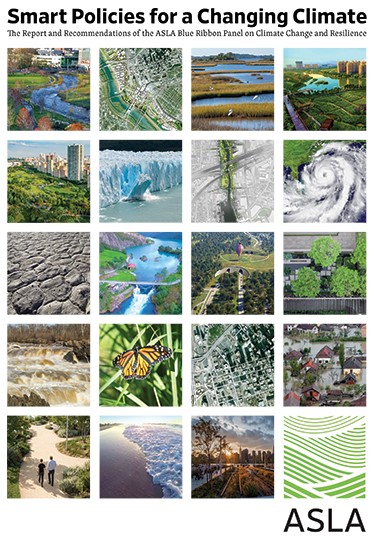 American Society of Landscape Architects Resources
American Society of Landscape Architects Resources
Resilient Solutions for Every Community
The ASLA advocates for legislation that has an impact on climate, and provides examples of projects that can mitigate climate change.
In addition, the recently published Blue Ribbon Panel on Climate Change and Resilience offers communities strategies for adapting to global climate change and its impacts on human health and the environment.
Government of Canada Resources
Canadian Climate Data and Scenarios
The Canadian Climate Data and Scenarios (CCDS) site is an interface for distributing climate change information.
ClimateData.ca
The Government of Canada is pleased to announce the launch of ClimateData.ca. The primary goal of this site is to increase access to climate data and information to help users better understand and adapt to our changing climate. ClimateData.ca is part of a continuum of climate data portals which aim to fill the needs of several types of climate data users. You can learn more about this continuum at the Canadian Centre for Climate Services website.
Natural Resources Canada Resources
 The Adaptation to Climate Change program facilitates the development and exchange of information, knowledge, and tools needed to plan and implement practical adaptation measures that increase the climate resilience of Canadian communities and industry.
The Adaptation to Climate Change program facilitates the development and exchange of information, knowledge, and tools needed to plan and implement practical adaptation measures that increase the climate resilience of Canadian communities and industry.
In addition, the following report is useful when working with municipalities: Adapting to Climate Change : An Introduction for Canadian Municipalities.
Measuring Progress on Adaptation and Climate Resilience: Recommendations to the Government of Canada
Expert Panel on Climate Change Adaptation and Resilience Results, Environment and Climate Change Canada.
 The Government of Canada Climate Lens: helping plan and build greener, more sustainable infrastructure for Canadians
The Government of Canada Climate Lens: helping plan and build greener, more sustainable infrastructure for Canadians
As part of the Investing in Canada plan, applicants seeking federal funding for new major public infrastructure projects will now be asked to undertake an assessment of how their projects will contribute to or reduce carbon pollution, and to consider climate change risks in the location, design, and planned operation of a project.
Perspectives on Climate Change Action in Canada—A Collaborative Report from Auditors General — March 2018
Canada’s auditors general found that most governments in Canada were not on track to meet their commitments to reducing greenhouse gas emissions and were not ready for the impacts of a changing climate. On the basis of current federal, provincial, and territorial policies and actions, Canada is not expected to meet its 2020 target for reducing greenhouse gas emissions. Meeting Canada’s 2030 target will require substantial effort and actions beyond those currently planned or in place. Most Canadian governments have not assessed and, therefore, do not fully understand what risks they face and what actions they should take to adapt to a changing climate.
Simon Fraser University's Adaptation to Climate Change Team
Professionals’ Best Practices for Low Carbon Resilience: Phase 1
In the spring of 2018, ACT (the Adaptation to Climate Change Team) at SFU hosted a series of three meetings with professionals and professional associations (provincial and national) to engage participants in discussion about the role of professionals and associations in championing and advancing Low Carbon Resilience (LCR) approaches.
Low Carbon Resilience: Best Practices for Professionals – Final Report
ACT is excited to announce the release of the final report and deliverables for our year-long project exploring low carbon resilience (LCR) best practices for professionals.
Related Association's Policies and Resources on Climate Change
Canadian Institute of Planners
Policy for Climate Change Planning: The newly launched Climate Change Policy defines the role that planning has in meeting the complex challenges of climate change, and calls planners to action to create communities that are resilient and contribute to climate stability. Read CIP’s full policy on addressing increasingly complex Climate Change issues (context, goals, objectives, and the roles of planners and CIP)
Engineers Canada
Engineers Canada works in partnership with all levels of government, other professions and industry to:
- research climate change issues
- understand the impacts of climate change on engineering practice
- understand the impacts of climate change for engineers
- propose adjustments to practice with regard to climate change
- share this knowledge with practising engineers
In addition Engineers Canada developed a risk management approach in partnership with Natural Resources Canada.
Council of Educators in Landscape Architecture (CELA)
In 2016, the CELA gave a CLASS Fund Award to the following website, that provides information about climate change for landscape architects, gardeners, and designers. The foundation for this site is a 2016 survey of landscape architects in Florida where information was gathered about climate change perceptions, information needs, and potential adaptation strategies related to different aspects of design and planning.
International Council for Local Environmental Initiatives; Local Governments for Sustainability
Guide and Workbook for Municipalities: ICLEI has published Changing Climate, Changing Communities: Guide and Workbook for Municipal Climate Adaptation, by authors: Ewa Jackson, Leya Barry,Nicole Marzok.
Adaptation Library: The Adaptation Library is a publicly accessible and searchable collection of community, forestry, and energy related adaptation products. The goal of the Library is to connect community and industry users with relevant information related to climate change adaptation in Canada and abroad.
Resources Developed by Canadian Universities
Pacific Climate Impacts Consortium
The Pacific Climate Impacts Consortium (PCIC) is a regional climate service centre at the University of Victoria that provides practical information on the physical impacts of climate variability and change in the Pacific and Yukon Region of Canada. They collaborate with climate researchers and regional stakeholders to produce knowledge and tools in support of long-term planning.
Intact Centre on Climate Adaptation, University of Waterloo, with funding support from Intact Financial Corp
The Intact Centre on Climate Adaptation (Intact Centre) is an applied research centre with a national focus within the Faculty of Environment at the University of Waterloo. The Intact Centre works with homeowners, communities, governments and businesses to identify, and reduce, the impacts of extreme weather and climate change.
Federation of Canadian Municipalities
Partners for Climate Protection: FCM’s focus has been on working with municipalities to reduce greenhouse gas emissions through its Partners for Climate Protection program.
Regional Climate Advisors: environmental experts from across Canada offering one-on-one advice, training and knowledge-sharing activities tailored specifically to provide members of the FCM-ICLEI Partners for Climate Protection program (PCP) with local expertise, resources and support to help municipalities reduce greenhouse gas emissions.
Municipalities for Climate Innovation Program: More recently FCM is focusing on climate adaptation and has launched the Municipalities for Climate Innovation Program (MCIP) is a five-year, $75-million program that helps municipalities prepare for, and adapt to, climate change, and to reduce emissions of greenhouse gases (GHGs). Delivered by the Federation of Canadian Municipalities (FCM) and funded by the Government of Canada, MCIP is available to all municipalities and their partners.
Climate Adaptation Partner Grants: FCM has provided grants to 12 organizations that will help participating communities of all sizes — from all regions of Canada — adapt to effects of climate change. The funding, known as climate adaptation partner grants, will enable the partner organizations to provide training and guidance on how to adapt to climate change to more than 70 municipalities across Canada. The grants, totaling $2.4 million, are delivered through FCM's Municipalities for Climate Innovation Program and funded by the Government of Canada.
Adaptation Resources: The FCM website includes information about “Adaptation Resources”, including
- Local Governments and Adaptation
- Local Government Adaptation Strategies
- Adaptation Planning Guides
- Risk Management and Assessment
- Climate Scenarios and Projections
- Case Studies
New report shows urgent need for climate adaptation investment
 The Federation of Canadian Municipalities (FCM) and the Insurance Bureau of Canada (IBC) released, on September 26, striking new data demonstrating the urgent need for new investments in local climate adaptation and the areas where that investment is needed most.
The Federation of Canadian Municipalities (FCM) and the Insurance Bureau of Canada (IBC) released, on September 26, striking new data demonstrating the urgent need for new investments in local climate adaptation and the areas where that investment is needed most.
According to the report's findings, avoiding the worst impacts of climate change at the municipal level will cost an estimated $5.3 billion per year shared amongst all three orders of government.
Those investments are critical to helping local communities adapt to the changing climate, and to reduce risk from extreme weather.
The report also found that Canada's eastern and northern regions are most in need of adaptation investments with flooding, erosion and melting permafrost posing the greatest risk. Among infrastructure priorities, local buildings, dikes and roads require the most urgent upgrades.
Other Recommended Resources
Diana Fernandez - Heterogeneous Futures
"Heterogeneous Futures" is at the nexus of anthropological and ecological biodiversity as a means for creating a more resilient public realm. The work exposes the interconnected relationship between difference in the ecology of the environment, and the social, cultural, and linguistic spatial mechanisms, to imagine and create public spaces that embrace a palimpsest of histories as well as spatial constructs that embrace heterogeneity as a landscape process.
Liz Camuti - Un-Checking the Boxes
Requests for Proposals (RFPs) largely define the potential of resiliency projects. Unfortunately, parameters set forth in these documents aren’t usually conducive to input from designers on particular structures and traditions of the communities said projects seek to “assist.” With a specific focus on the Resettlement of Isle de Jean Charles, Liz's work questions: 1) how criteria for a “successful” project might evolve through a different form of RFP, and 2) how designers can adapt their own roles in order to break historical cycles of erasure and control that have shaped environmental history in Louisiana.
 Video series: Climate resilience and asset management
Video series: Climate resilience and asset management
Understanding and adapting to the impacts of climate change on municipal infrastructure and service delivery requires a dedicated approach and strong leadership. We created this video series to share how municipalities and practitioners across Canada are making climate action a part of their municipal asset management practices and decision-making.
Report: National Measures Report 2019
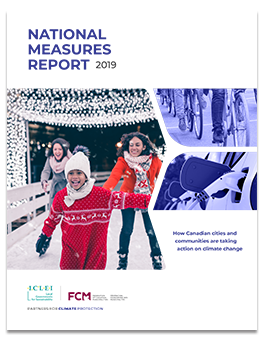 The 2019 National Measures Report showcases how members of the Partners for Climate Protection (PCP) program are committed to climate action at the local level.
The 2019 National Measures Report showcases how members of the Partners for Climate Protection (PCP) program are committed to climate action at the local level.
Over 400 PCP member municipalities across Canada developed 420 projects to reduce GHG emissions, both in municipal operations and in the way energy is used in homes, businesses and transportation. Some of the 10 top reported actions include:
- Retrofit programs for residential and/or commercial buildings
- Installation of electric vehicle charging stations for public use
- Enhancement of walking and cycling infrastructure including sidewalks, multi-purpose trails, bike lanes, paved road shoulders, etc.
How Thawing Permafrost Is Beginning to Transform the Arctic
The frozen layer of soil that has underlain the Arctic tundra for millennia is now starting to thaw. This thawing, which could release vast amounts of greenhouse gases, is already changing the Arctic landscape by causing landslides, draining lakes, and altering vegetation.
Why protecting nature makes good business sense
Nature is essential to global economic prosperity and individual business success. We cannot have a sustainable future for people and economies if we do not address nature, climate and people in an integrated way.
Landscape Architects Rise to the Climate Crisis
 A month of the largest collective climate activist events in history culminates with the launch of the Climate Positive Design Challenge that enables the global landscape architecture profession to take climate action. The Challenge establishes targets for reducing emissions and sequestering carbon in the built environment, with a goal of going ‘beyond neutral’ – sequestering more carbon than emitted and providing a positive contribution towards reversing global warming. The Challenge targets can be met using the web-based app called the Pathfinder, which guides designers on a path towards making their projects Climate Positive.
A month of the largest collective climate activist events in history culminates with the launch of the Climate Positive Design Challenge that enables the global landscape architecture profession to take climate action. The Challenge establishes targets for reducing emissions and sequestering carbon in the built environment, with a goal of going ‘beyond neutral’ – sequestering more carbon than emitted and providing a positive contribution towards reversing global warming. The Challenge targets can be met using the web-based app called the Pathfinder, which guides designers on a path towards making their projects Climate Positive.
To take the Challenge, go to www.ClimatePositiveDesign.com
A Toolkit on Climate Change for Northern Communities
The NWT Association of Communities presents its climate toolkit, which includes the Guide to Climate Change in Your Community.
Investor interviews on climate disclosure and decision-making: Key findings
Investors recognize that a transition to a low-carbon economy is happening, bringing significant investment opportunities and risks. Are you prepared to respond with the information they need?
Canada's Changing Climate Report
This report is about how and why Canada’s climate has changed and what changes are projected for the future. Led by Environment and Climate Change Canada, it is the first report to be released as part of Canada in a Changing Climate: Advancing our Knowledge for Action.
Environmental lawyer Margaret Peleso discusses the legal implications of sea level rise, useful to landscape architects
Changing Climate - Changing Standard of Care by XL Insurance.
Climate Risk Assessment for Ecosystem-based Adaptation
A guidebook for planners and practitioners
Published by:
Deutsche Gesellschaft für
Internationale Zusammenarbeit (GIZ) GmbH
Climate change as a catalyst for implementing adaptive management by the Northern Hardwoods Research Institute (November 2019)
 THE TIME FOR ADAPTIVE FOREST MANAGEMENT HAS COME!
THE TIME FOR ADAPTIVE FOREST MANAGEMENT HAS COME!
WHAT CAN WE DO NOW TO ENSURE OUR FORESTS THRIVE IN A CHANGING CLIMATE?
According to the Intergovernmental Panel on Climate Change, under the more likely business as usual scenario, where humanity continues to emit greenhouse gases at the current rate, we can expect one degree of increase in average annual temperature per decade. By the end of this century we could be experiencing a climate like that of Virginia today. Great news! We can contact the tree nurseries down there, order black cherry, black walnut and loblolly pine and we are all set right? Absolutely not; at least not just yet; the next late spring frost would likely kill the new recruits!


_Page_1_0.jpg)
